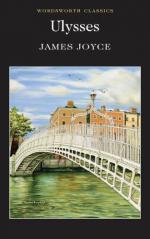After which effusion the redoubtable specimen duly arrived on the scene and regaining his seat he sank rather than sat heavily on the form provided. Skin-the-Goat, assuming he was he, evidently with an axe to grind, was airing his grievances in a forcible-feeble philippic anent the natural resources of Ireland or something of that sort which he described in his lengthy dissertation as the richest country bar none on the face of God’s earth, far and away superior to England, with coal in large quantities, six million pounds worth of pork exported every year, ten millions between butter and eggs and all the riches drained out of it by England levying taxes on the poor people that paid through the nose always and gobbling up the best meat in the market and a lot more surplus steam in the same vein. Their conversation accordingly became general and all agreed that that was a fact. You could grow any mortal thing in Irish soil, he stated, and there was that colonel Everard down there in Navan growing tobacco. Where would you find anywhere the like of Irish bacon? But a day of reckoning, he stated Crescendo with no uncertain voice, thoroughly monopolising all the conversation, was in store for mighty England, despite her power of pelf on account of her crimes. There would be a fall and the greatest fall in history. The Germans and the Japs were going to have their little lookin, he affirmed. The Boers were the beginning of the end. Brummagem England was toppling already and her downfall would be Ireland, her Achilles heel, which he explained to them about the vulnerable point of Achilles, the Greek hero, a point his auditors at once seized as he completely gripped their attention by showing the tendon referred to on his boot. His advice to every Irishman was: stay in the land of your birth and work for Ireland and live for Ireland. Ireland, Parnell said, could not spare a single one of her sons.
Silence all round marked the termination of his finale. The impervious navigator heard these lurid tidings, undismayed.
—Take a bit of doing, boss, retaliated that rough diamond palpably a bit peeved in response to the foregoing truism.
To which cold douche referring to downfall and so on the keeper concurred but nevertheless held to his main view.
—Who’s the best troops in the army? the grizzled old veteran irately interrogated. And the best jumpers and racers? And the best admirals and generals we’ve got? Tell me that.
—The Irish, for choice, retorted the cabby like Campbell, facial blemishes apart.
—That’s right, the old tarpaulin corroborated. The Irish catholic peasant. He’s the backbone of our empire. You know Jem Mullins?
While allowing him his individual opinions as everyman the keeper added he cared nothing for any empire, ours or his, and considered no Irishman worthy of his salt that served it. Then they began to have a few irascible words when it waxed hotter, both, needless to say, appealing to the listeners who followed the passage of arms with interest so long as they didn’t indulge in recriminations and come to blows.




